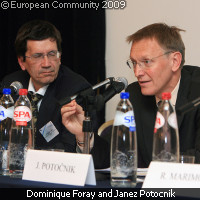Innovation policy in times of crisis: the Knowledge for Growth group
'Before the crisis, the question was how Europe can improve its innovation performance compared with the US. With the current downturn, the US and Europe are looking at innovation as a vehicle to get us out of the deep hole our economies have turned into,' said Bart van Ark of The Conference Board at the final conference of the 'Knowledge for Growth' (K4G) group in Brussels, Belgium on 25 June. EU Science and Research Commissioner Janez Potocnik set up the K4G group in 2005. Since then, it has provided him with top-level advice on several issues: how knowledge can contribute to sustainable growth and prosperity; what policy mixes can promote knowledge creation, dissemination and use; and the role that different stakeholders can play in creating the knowledge society. Among other things, its recommendations have influenced recent developments in the creation of the European Research Area (ERA). The group's final conference is particularly timely, given the current economic crisis. Many speakers cited the old saw that you should never let a crisis go to waste. However, as Professor van Ark pointed out, that is easier said than done. Demand is falling, access to capital is increasingly difficult, skilled workers are being laid off and companies are struggling to survive. In this climate, their focus is largely on the short term and they have little incentive to innovate. Nevertheless, as Commissioner Potocnik pointed out, 'history has shown us that investments made in innovation and research when the prevailing advice has been that these are a luxury, have proved to be anything but.' Both the iPod and more fuel efficient engines were developed during the last economic crisis, he pointed out. With this in mind, many speakers highlighted the need for more research funding from both the public and private sector. As it is, the EU is extremely unlikely to reach its target of spending 3% of GDP (Gross Domestic Product) on research by 2010. A great deal of attention was placed on the need to use resources more effectively. The EU's Joint Programming scheme, under which Member States will combine resources and work towards a common research agenda for a given issue, was the subject of much discussion. While this scheme is a step in the right direction, for many at the conference it is still not enough. 'The European scale is the most logical scale for publicly funded research activities,' said Luc Soete of the United Nations University in Maastricht, the Netherlands. 'We should eventually have common research policies; joint programming isn't enough.' A topic that popped up throughout the day was the importance of improving the diffusion of knowledge. 'It is not enough to create new knowledge - you need to diffuse it,' said Commissioner Potocnik. Roland Sommer of the Federation of Austrian Industries pointed out that the digital divide does not constitute a technical challenge, but rather one of diffusion and education. K4G group vice chair Dominique Foray of the École Polytechnique Fédérale de Lausanne in Switzerland added that ensuring that all companies adopt the most efficient technologies would help in the fight against climate change. Meanwhile, Professor van Ark noted that the services sector, especially in Europe, could make much better use of ICTs (Information and Communication Technologies).



